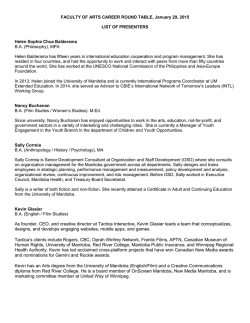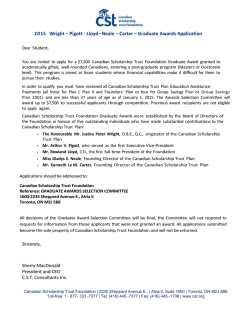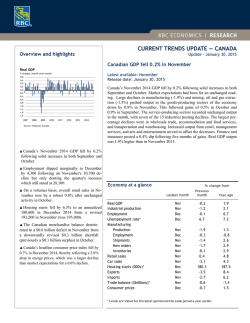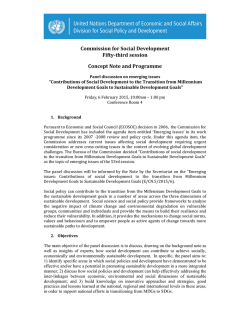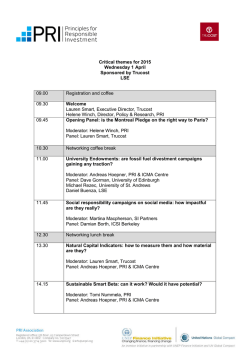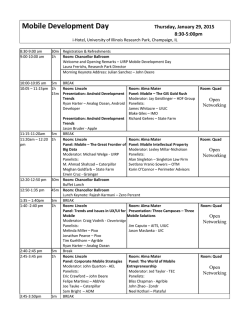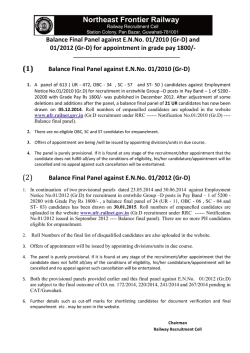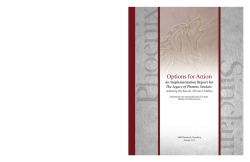
here - University of Manitoba
The Great Wars: Marking History and Humanity Speaker/Moderator Bios Barry Burns – Moderator Panel 1 Honourary Lieutenant Colonel Barry Burns (38 Signal Regiment) is a retired radio and television news anchor. As a professional broadcaster, Mr. Burns has volunteered to serve as master of ceremonies at events for cadets, reserve forces, Remembrance Day and other commemorative activities. He served as a board member of the Duke of Edinburgh’s Award. Mr. Burns was the executive director of the "Pillows for Troops" Foundation, which sent 8,000 travel pillows to Canadian soldiers serving in Afghanistan. In 2006, Mr. Burns was dispatched to Afghanistan where he provided live broadcast reports on the good work Canada’s troops were doing. He was subsequently nominated for the Ross Munroe Media Award from the Canadian Defence Association for his positive broadcasting. Mr. Burns is an active member of the Army, Navy and Air Force Veterans in Canada and is currently the President of the Royal Military Institute of Manitoba. He is also a governor of the Canadian Corps of Commissionaires, which provides meaningful employment to Veterans. In 2010, Mr. Burns was presented with a Canadian Lifesaving Award for saving a drowning person in Falcon Lake. Andrew Burtch – “Cold War Civil Defence” Panel 3 Dr. Andrew Burch is Director of Research at the Canadian War Museum. Dr. Andrew Burtch has been the Museum’s historian for the post-1945 period since May 2006. As curator of Gallery 4: A Violent Peace, he is responsible for all questions relating to conflicts from the beginning of the Cold War to the present day. He has been Acting Director of Research since April 2014. Dr. Burtch completed his doctorate in Canadian history at Carleton University in 2009. His research specialty includes the Cold War home front and nuclear civil defence. He has worked to develop temporary and permanent exhibitions about the Canadian mission in Afghanistan, peacekeeping in Cyprus and efforts to resolve the conflict in the former Yugoslavia. Dr. Burtch has published several journal articles and book reviews. His first book, Give Me Shelter: The Failure of Canada’s Nuclear Civil Defence Program, 1945-1963, is forthcoming from the University of British Columbia Press. Dr. Burtch is an adjunct research professor at Carleton University, and a Research Fellow at the University of Waterloo’s Centre on Canadian Foreign Policy and Federalism. 1 Adam Chapnick – “The Great Wars and Contemporary Institutions of International Order” Dr. Adam Chapnick is the deputy director of education at the Canadian Forces College (CFC) and an associate professor of defence studies at the Royal Military College of Canada. At the CFC, he teaches courses in Canadian government and strategic decision-making, critical thinking and writing, and Canadian international policy. Among his six written or edited books, Canada’s Voice: The Public Life of John Wendell Holmes (2009) and The Middle Power Project: Canada and the Founding of the United Nations (2005) were shortlisted for the annual Dafoe Prize, recognizing the best book on Canada or Canada and the world. He is also the author of over 40 academic essays and book chapters on historical and contemporary issues in Canadian foreign relations, Canadian-American relations, and teaching and learning. In 2013, he became the co-editor of International Journal, Canada’s leading journal of global policy analysis. Andrea Charron – Moderator Panel 3 Dr. Andrea Charron holds a PhD from the Royal Military College of Canada (Department of War Studies). She obtained a Masters in International Relations from Webster University, Leiden, The Netherlands, a Master’s of Public Administration from Dalhousie University and a Bachelor of Science (Honours) from Queen’s University. Dr. Charron worked for various federal departments including the Privy Council Office in the Security and Intelligence Secretariat. She completed her post doctorate at Carleton’s Norman Paterson School of International Affairs and is now Assistant Professor and Deputy-Director of the Centre for Defence and Security Studies at the University of Manitoba. Catherine Chatterley - “Why We Now Call It Hitler`s War: Antisemitism, and the Origins of WWII” Panel 2 Dr. Catherine Chatterley is a respected historian, an award-winning writer, and a frequent lecturer in Canada and the United States who trained at The University of Chicago under the supervision of leading international scholars: Moishe Postone, Michael Geyer, Mark Krupnick, and Peter Novick. Dr. Chatterley specializes in the study of modern European history, with particular emphasis on the history of Antisemitism and the dynamic relationship between Jews and non-Jews in Western history. She has been a media commentator in public debates over the design and content of the Canadian Museum for Human Rights and the growth of anti-Israel activism on Canadian campuses. Dr. Chatterley has taught history at the University of Manitoba, University of Winnipeg, and Concordia University. She is currently the Director of the Canadian Institute for the Study of Antisemitism (CISA), which she founded in 2010. 2 Jim Fergusson - “Was M.A.D. mad?” Panel 3 Dr. James Fergusson is the Director of the Centre for Defence and Security Studies, a Professor in the Department of Political Studies at the University of Manitoba, and a Research Fellow with the Canadian Defence and Foreign Affairs Institute. His recent publications include “Ballistic Missile Defence: NATO’s European Phased Adaptive Approach” Atlantisch Perspectief. 4: 2013; “The Right Debate: Airpower, the Future of War, Canada’s Strategic Interests and the F-35 Decision.” Canadian Foreign Policy Journal, Winter 2012; Canada and Ballistic Missile Defence 19542009: Déjà vu all over again, Canadian War Museum Military History Series. Vancouver: University of British Columbia Press, 2010. In addition to his academic publications, Dr. Fergusson has been commissioned to write several reports for the Department of National Defence and the Department of Foreign Affairs. Dr. Fergusson has testified on several occasions to the Standing Committee on Foreign Affairs and International Trade and the Standing Committee on National Defence. He is also a member of the Defence Science Advisory Board. Dr. Fergusson is currently working on several major research projects: After Afghanistan: Reflections on Canadian International Security Policy; What Lurks Beneath: Essays on the Canadian Defence Problem; and NORAD in Perpetuity. Captain Emmanuel Goffi – “Drones and the Future of War” Panel 5 Captain of the French Air Force, Emmanuel R. Goffi is a specialist in military ethics and security studies. He lectured in international relations and the law of armed conflicts at the French Air Force Academy for five years before he was appointed as an analyst and research associate at the Center for Aerospace Strategic Studies in Paris. Emmanuel also lectured in IR at the Management Institute in Paris, at the Diplomatic Science Institute in Marseille and at the Paris Graduate School of Business and Management. He holds a master's degree in political science "International affairs - Conflicts and Security" from the Paris Institute of political studies (Science Po), and a research master's degree in political science "Geostrategy, defence and security" from the Aix en Provence Institute of Political Studies. Emmanuel is currently doing a PhD (ABD) on "Supreme sacrifice and French Officers: Construction and Deconstruction of a Myth at Science Po-CERI”. Captain Goffi's research focuses on constructivism and security studies, military ethics and the ethical aspects of the use of drones and robots in battle. Kyle Haddad-Fonda – “Chinese/Arab Perspectives of the Cold War” Panel 3 Dr. Kyle Haddad-Fonda is Director of Strategic Initiatives for the Nicholas Sparks Foundation, a non-profit organization that promotes access to global education. He completed a DPhil in Oriental Studies from the University of Oxford, where he was a Rhodes Scholar. His doctoral research focused on China’s relations with Egypt and Algeria in the 1950s and 1960s. He previously taught in the University Honors Program at Al Akhawayn University in Ifrane, Morocco, and researched contemporary aspects of Sino-Arab relations as a postdoctoral researcher at the Center for Middle East Peace Studies of Shanghai Jiao Tong University. 3 James Hanley – “Medicine and the Homefront in Britain” Panel 4 Dr. James Hanley is an Associate Professor of History at the University of Winnipeg where he teaches the history of science and medicine and British history. He completed his PhD at Yale University and his B.Sc., M.Sc. and MA at the University of Toronto. His research specialization is Victorian health and medicine. He has published articles on Victorian health statistics, nuisance law, and public reactions to public health. His manuscript “Healthy Boundaries: Property, Law and Public Health, 1815-1875” is under review at the University of Rochester Press. He is currently researching the significance of local health policy on changing conceptions of the role of the Victorian state and social citizenship. Brigadier General Charles Hyde – “Future of War” Panel 5 Brigadier General Charles K. Hyde is the Deputy Commander, Canadian North American Aerospace Defense Region, and Deputy Combined/Joint Force Air Component Commander for 1 Canadian Air Division, Winnipeg, Manitoba, Canada. He is the principal adviser to the Canadian Commander and assumes command of NORAD forces assigned to CANR in the commander's absence. General Hyde is responsible for ensuring that the region's battle staff, air operations center, flying units, radar sensors, intelligence and command-and control-assets provide airspace warning and control, and space and maritime warning. He is the senior U.S. military officer in Canada and represents the U.S. military and his service, and is responsible for mission effectiveness and administration of U.S. Air Force units assigned to Canada. General Hyde was commissioned in 1987 as a distinguished graduate of the U.S. Air Force Academy. He has commanded at the squadron, group and wing levels. His commands include the 320th Expeditionary Operations Group at Seeb Air Base, Oman, during operations Enduring Freedom and Iraqi Freedom, Vice Commander of the 386th Air Expeditionary Wing, Southwest Asia, and 314th Airlift Wing at Little Rock AFB, Arkansas. His senior staff experience includes Chief, Distribution Division, Directorate of Logistics, J-4, the Joint Staff, at the Pentagon, Washington, D.C. and Deputy Director of Intelligence, Operations, and Nuclear Integration for Flying Training, Headquarters AETC, Randolph AFB, Texas. Prior to his current assignment, General Hyde served as the Commander, 86th Airlift Wing, Ramstein Air Base, Germany. Stephan Jaeger - ``The Memory and Significance of the Second World War in North America, Western and Central Europe in the 21st Century`` Panel 2 Dr. Stephan Jaeger is Full Professor of German Studies at the University of Manitoba and Head of the Department of German and Slavic Studies. He has published extensively on narratology, history and literature, documentary history in historiography, film, and the museum, representations of war, and romantic and modern poetry. He published two monographs: Theory of Lyrical Expression (Fink 2001); Performative Historiography in the Late-Eighteenth Century (de Gruyter 2011) and five coedited books including Fighting Words and Images: Representing War across the Disciplines (University of Toronto Press, 2012) and a special issue of Seminar 50.1 (February 2014): Representations of German War Experiences from the Eighteenth Century to the Present. He is co-coordinator of the Interdisciplinary Network War and Violence of the German Studies Association. Currently he works on a comparative research project on twenty-first century museum representations of World War II in North America and Europe (Germany, Poland, U.K., Belgium, Canada, US). 4 Iain Johnston – “Dominions and WWII” Panel 2 Dr Iain Johnston studied for an honours degree in history at the University of Stirling in Scotland before completing his Master’s and PhD at the University of Cambridge. His PhD dissertation looked at the role of the Dominions - Canada, Australia, New Zealand and South Africa - in British victory in the Second World War. This study demonstrated the extent to which the UK relied on the Dominions to underwrite its entire war strategy, particularly in the crucial early years during which British survival was by no means assured. He has an article on the war at sea published in Global War Studies, and an upcoming article in the Journal of Imperial and Commonwealth History that considers the issue of national identity for Dominion service personnel participating within the UK’s armed forces. Dr Johnston has also contributed to upcoming edited volumes on The Imperial World at War and Fighting for Britain: Britishness and the Second World War. During his PhD research, Iain worked in archives on four continents and has presented at conferences in Britain, France, Denmark, Canada, the USA and Hong Kong. He is currently a Visiting Student at Sciences Po in Paris, France. David McDonald “Russia 1917” Panel 1 Dr. David McDonald is professor in the faculty of History and the University of Wisconsin. His research area is Russia and the revolution of 1917. He has a PhD from Columbia University and an MA and BA from the University of Toronto. Terry MacLeod – Moderator Panel 4 In his more than 20 years with CBC Manitoba Terry MacLeod has established himself as a respected, informed, inquisitive and compassionate presence on the Winnipeg scene. Now, he is waking up with Winnipeggers and helping to get their weekends started at the host of The Weekend Morning Show on CBC Radio One 89.3 FM / 990 AM. Terry has been involved with a multitude of organizations; from The Teddy Bear's Picnic to The Gimli Folk Festival to the Information Technology Association of Manitoba to The Manitoba Architects Association to The Truth & Reconciliation Commission and is presently on the board of the Gimli Film Festival. In 2013, Terry received the Queen's Diamond Jubilee Medal for his community service and was also awarded the Ihsan Award from Islamic Social Services of Winnipeg in recognition of his work building bridges between communities. He has received a special Award of Merit for his volunteer work with The Canadian Muslim Leadership Institute. Melanie Morin-Pelletier, “Not so quiet on the Homefront: an update to the Canadian War Museum’s FWW permanent gallery”, Panel 4 Dr. Melanie Morin-Pelletier is the First World War Historian at the Canadian War Museum. She is the author of Briser les ailes de l'ange: Les infirmières militaires canadiennes (1914-1918). Her current research interests focus on human experiences of the war, whether on the battlefield, in military hospitals or on the homefront. 5 Dean Oliver – “Canada and the Outbreak of War”, Panel 1 Dr. Dean Oliver is Director of Research at the Canadian Museum of History. He holds a doctorate in history from York University and has taught history, political science and international security. A long-time contributor to the Canadian Annual Review of Politics and Public Affairs and past editor of the monograph series Studies in Canadian Military History, he is a well-known writer, lecturer, and media commentator. His most recent book (with J.L. Granatstein), The Oxford Companion to Canadian Military History (2010), won the annual Charles P. Stacey Award as the best book published on Canadian military history. In April 2010, Queen Beatrix of The Netherlands made Dr. Oliver a Knight in the Order of Orange-Nassau in honour of his “contributions to society” through his scholarly and museum work. Bryan Peeler – “Geneva Conventions and Reciprocity” Panel 5 Bryan Peeler is a PhD Candidate in Political Science at the University of British Columbia and a Research Fellow with the Centre for Defence and Security Studies here at the University of Manitoba. His dissertation focuses on the role reciprocity continues to play in compliance with the law of armed conflict. In particular, he is interested in the impact of the conceptual shift away from a sovereignty-oriented approach to a people-centered approach has had on compliance with the law’s humanitarian goals. Mr. Peeler also holds graduate degrees in Philosophy from the University of Manitoba and King’s College, London. Jody Perrun “Manitoba’s Contribution to WWII” Panel 4 Dr. Perrun completed his PhD at the University of Manitoba. He is famous for his tours of the Holocaust which seek to educate and ensure future generations never forget. 6 Brigadier General Ploughman – “Future of War” Panel 5 Brigadier-General Bruce Ploughman joined the Canadian Forces as a Direct Entry Officer in December 1988. Upon completion of pilot training, he was posted to 12 Wing Shearwater, where he was employed as a line pilot, a standards pilot and an instructor, all on the venerable Sea King. During his multiple tours at 12 Wing, Brigadier-General Ploughman has had the privilege to command at the detachment, flight, squadron and wing level, the most recent being command of the Joint Task Force Afghanistan Air Wing in 2009. Staff appointments have included 12 Wing Commander's executive assistant, aerospace requirements officer, 12 Wing operations officer, Maritime Helicopter deputy project manager, combined aerospace operations centre director, Canadian Expeditionary Force Command chief of staff and 1 Canadian Air Division Deputy Commander Force Generation. Brigadier-General Ploughman is a graduate of the Canadian Forces Command and Staff Course, the Advanced Military Studies Course, the Canadian Security Studies Program and the Queen's Public Executive Program. He holds a Bachelor of Science in Biology, a Bachelor of Education and a Bachelor of Physical Education from Memorial University of Newfoundland. Honourary Colonel Barry Rempel – Moderator Panel 5 Mr. Barry Rempel was appointed as the first Honourary Colonel of 1 Canadian Air Division Headquarters in Winnipeg, MB in September 2012. He is also a member of the Royal Canadian Air Force Commander’s Council and previously served as the Honourary Colonel of 17 Wing Winnipeg, MB. Born in Carmen, MB., Honourary Colonel Rempel has some 30 distinguished years in the Canadian aviation industry. Prior to his appointment in 2002 as president and CEO of Winnipeg Airports Authority Inc., he was president and CEO of Tradeparks Development Corp., the land/business development subsidiary of Calgary Airport Authority from 2000 to 2002. From 1974 to 2000, Honourary Colonel Rempel was employed with Canadian Airlines International, his last position with them being chief executive for Cargo and Canadian North operating divisions. A proponent of lifelong learning, Honourary Colonel Rempel was recognized with the top student award while studying business administration (marketing and retailing) at the University of British Columbia in 1980. He is also a 1995 graduate of the executive program at Queens University. He has also received his diploma in public relations from BCIT, along with his aviation ground school certificate. Honourary Colonel Rempel has a strong commitment to community service and volunteers his time to the United Way of Winnipeg as well as serving on the Board of the University of Manitoba Associates, Canadian Chamber of Commerce, Airports Council International and the Canadian Airports Council. 7 Jeffery Taylor – Moderator Panel 2 Dr. Jeffery Taylor began his term as Dean of the Faculty of Arts of the University of Manitoba on 1 September 2011. Dr. Taylor is an historian specializing in Canadian labour history. He is the author of two books and numerous articles in Canadian labour history and Canadian history more generally. He also has an interest in internet-based learning and has published a number of articles on the use of online technologies in workplace education and training. His current research interests include the origins and development of workplace grievance and arbitration systems in Canada and the application and use of internet-based learning technologies in higher education. Timothy C. Winegard - “First Nations and WWI” Panel 1 Dr. Timothy C. Winegard served nine years as an officer in the Canadian and British Forces, and is the author of four books and numerous articles and chapters in the fields of both military history and indigenous/native peoples. Originally from Sarnia, Ontario, he now teaches a variety of courses in history and political science at Colorado Mesa University, in Grand Junction, Colorado, where he is also the head coach of the Men’s Varsity Hockey Team. He is the author of The First World Oil War. Toronto: University of Toronto Press, forthcoming 2015, For King and Kanata Canadian Indians and the First World War. Winnipeg: University of Manitoba Press, 2012, Indigenous Peoples of the British Dominions and the First World War. Cambridge: Cambridge University Press, 2011 and Oka: A Convergence of Cultures and the Canadian Forces. Kingston: Canadian Defence Academy (CDA) Press, 2008. www.timothycwinegard.com Robert Young – “Origins of WWII” Panel 2 Author of 9 works of non-fiction, Dr. Robert J. Young is Emeritus Professor of History at the University of Winnipeg. Recipient of its awards for excellence in Teaching and in Research, Young was named Canadian Professor of the Year (1996), and won the Canadian Historical Association’s Ferguson Prize for his first biography, Power and Pleasure, a life of the French statesman Louis Barthou. His second, An American By Degrees, won the Manitoba Writers Guild’s Alexander Isbister Prize for Non-Fiction. Published in 2009, this work is addressed to the 20th century French ambassador to Washington, Jules Jusserand. His book, France and the Origins of the Second World War appeared in 1996, and his latest book, Premonitions of War. The Winnipeg Free Press in the Hitler Years, will be published by the Winnipeg Free Press in 2015. 8 The Great Wars: Marking History and Humanity Wednesday January 28, 2015 Keynote: “The Impact of World War One and Two on Canada and the West” Allan Levine (confirmed) (McNally Robinson Booksellers) 7pm – 7:45pm talk. 7:45pm – 8:15pm Q and A. Thursday January 29, 2015, University of Manitoba, Great Hall 10:00AM Panel One: WWI Speaker Institution Tim Winegard Colorado Mesa University David McDonald University of Wisconsin Dean Oliver Canadian Museum of History Moderator HLCol Barry Burns Thursday January 29, 2015 1:00PM Panel Two: WWII Speaker Institution Robert Young University of Winnipeg Iain Johnston Cambridge University Catherine University of Manitoba Chatterley Stephan Jaeger University of Manitoba Moderator Jeffery Taylor 2:45PM Panel Three: Cold War Speaker Institution Jim Fergusson University of Manitoba Andrew Burtch War Museum Dr Kyle HaddadMiddle East Institute Fonda Moderator Andrea Charron Specialization First Nations and WWI Russia 1917 Canada and the Outbreak of War Honourary Lieutenant Colonel 38 Signal Regiment Specialization Origins of WWII Dominions and WWII Why We Now Call It Hitler's War: Antisemitism and the Origins of WWII The Memory and Significance of the Second World War in North America, Western and Central Europe in the 21st Century. Dean of Arts Specialization Was M.A.D. mad? Cold War Civil Defence Chinese/Arab Perspective of Cold War Deputy-Director, Centre for Defence and Security Studies 9 Friday January 30, 2015, University of Manitoba, Great Hall 9:30AM Panel Four: Impact on Humanity Speaker Adam Chapnick Institution Canadian Forces College Melanie MorinPelletier James Hanley Jody Perrun War Museum Moderator Terry MacLeod University of Winnipeg University of Manitoba 11:30 AM Panel Five: Future of Wars Speaker Institution Brigadier General 2 CAD Ploughman Brigadier General 1 CAD Hyde Bryan Peeler University of Manitoba Emmanuel Goffi University of Manitoba Moderator HCol Rempel Specialization The Great Wars and Contemporary Institutions of International Order Not so quiet on the Homefront: an update to the Canadian War Museum’s FWW permanent gallery Medicine and the Home Front in Britain Manitoba’s contribution to WWII and after effects (suggestion) CBC radio host “The Weekend Morning Show” Specialization Commander, 2 Canadian Air Division Deputy-Commander, Canadian NORAD Region (CANR) Geneva Conventions and Reciprocity Drones and the future of war Honourary Colonel 1 CAD 13:00 Final Remarks – PSSC Organizing Committee 10
© Copyright 2026
